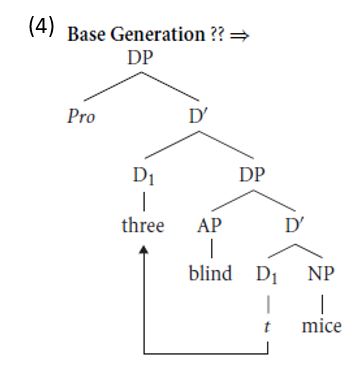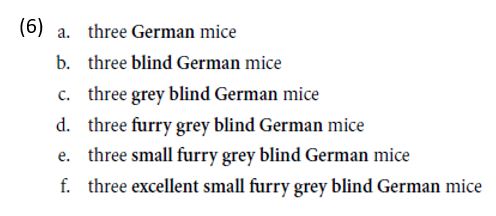

Grammar


Tenses


Present

Present Simple

Present Continuous

Present Perfect

Present Perfect Continuous


Past

Past Simple

Past Continuous

Past Perfect

Past Perfect Continuous


Future

Future Simple

Future Continuous

Future Perfect

Future Perfect Continuous


Parts Of Speech


Nouns

Countable and uncountable nouns

Verbal nouns

Singular and Plural nouns

Proper nouns

Nouns gender

Nouns definition

Concrete nouns

Abstract nouns

Common nouns

Collective nouns

Definition Of Nouns

Animate and Inanimate nouns

Nouns


Verbs

Stative and dynamic verbs

Finite and nonfinite verbs

To be verbs

Transitive and intransitive verbs

Auxiliary verbs

Modal verbs

Regular and irregular verbs

Action verbs

Verbs


Adverbs

Relative adverbs

Interrogative adverbs

Adverbs of time

Adverbs of place

Adverbs of reason

Adverbs of quantity

Adverbs of manner

Adverbs of frequency

Adverbs of affirmation

Adverbs


Adjectives

Quantitative adjective

Proper adjective

Possessive adjective

Numeral adjective

Interrogative adjective

Distributive adjective

Descriptive adjective

Demonstrative adjective


Pronouns

Subject pronoun

Relative pronoun

Reflexive pronoun

Reciprocal pronoun

Possessive pronoun

Personal pronoun

Interrogative pronoun

Indefinite pronoun

Emphatic pronoun

Distributive pronoun

Demonstrative pronoun

Pronouns


Pre Position


Preposition by function

Time preposition

Reason preposition

Possession preposition

Place preposition

Phrases preposition

Origin preposition

Measure preposition

Direction preposition

Contrast preposition

Agent preposition


Preposition by construction

Simple preposition

Phrase preposition

Double preposition

Compound preposition

prepositions


Conjunctions

Subordinating conjunction

Correlative conjunction

Coordinating conjunction

Conjunctive adverbs

conjunctions


Interjections

Express calling interjection

Phrases

Sentences


Grammar Rules

Passive and Active

Preference

Requests and offers

wishes

Be used to

Some and any

Could have done

Describing people

Giving advices

Possession

Comparative and superlative

Giving Reason

Making Suggestions

Apologizing

Forming questions

Since and for

Directions

Obligation

Adverbials

invitation

Articles

Imaginary condition

Zero conditional

First conditional

Second conditional

Third conditional

Reported speech

Demonstratives

Determiners


Linguistics

Phonetics

Phonology

Linguistics fields

Syntax

Morphology

Semantics

pragmatics

History

Writing

Grammar

Phonetics and Phonology

Semiotics


Reading Comprehension

Elementary

Intermediate

Advanced


Teaching Methods

Teaching Strategies

Assessment
The problem of prenominal modifiers
المؤلف:
RICHARD LARSON AND HIROKO YAMAKIDO
المصدر:
Adjectives and Adverbs: Syntax, Semantics, and Discourse
الجزء والصفحة:
P56-C3
2025-04-06
816
The problem of prenominal modifiers
The view sketched above can be extended to other postnominal modifiers including PPs, as in (1a), reduced relative clauses, as in (1b), and combinations of them as in (1c). The latter involve recursive DP shells and multiple raising to light heads, as shown in (2).


But what about prenominal modifiers, APs like those in (3), which are semantically equivalent to copular relative clauses? 1

One possibility is base generation along the lines in (4).

On reflection, however, this idea is problematic. Given a Ë-role-based approach, in order to project AP in the site shown in (4), we would apparently have to allow for an optional oblique Ë-role between two obligatory roles in our hierarchy, as in (5).

Worse yet, given the wide range of modifiers available in the prenominal site, we would seem to have to allow for a very large number of optional oblique Ë-roles between our two obligatory ones (6). This looks unpromising.

The only plausible alternative we see is that prenominal position is not a base position for adjectives in English, but rather a derived one. That is, we are led to resurrect the view of early transformationalists: that intersective attributive APs originate in the position of RCs, and obtain their surface position by movement, along the lines shown in either (7a) or (7b).

However, this raises the natural question as to why restrictive adjectives must move from their base position. Why can’t they remain in postnominal position like PPs, finite and reduced relative clauses?
1 We are not suggesting, of course, that all prenominal modifiers are equivalent to relative clauses. In fact there are well-known differences between them. For more on this topic see Larson (1998) and Larson and Takahashi (2007).
 الاكثر قراءة في Linguistics fields
الاكثر قراءة في Linguistics fields
 اخر الاخبار
اخر الاخبار
اخبار العتبة العباسية المقدسة

الآخبار الصحية















 قسم الشؤون الفكرية يصدر كتاباً يوثق تاريخ السدانة في العتبة العباسية المقدسة
قسم الشؤون الفكرية يصدر كتاباً يوثق تاريخ السدانة في العتبة العباسية المقدسة "المهمة".. إصدار قصصي يوثّق القصص الفائزة في مسابقة فتوى الدفاع المقدسة للقصة القصيرة
"المهمة".. إصدار قصصي يوثّق القصص الفائزة في مسابقة فتوى الدفاع المقدسة للقصة القصيرة (نوافذ).. إصدار أدبي يوثق القصص الفائزة في مسابقة الإمام العسكري (عليه السلام)
(نوافذ).. إصدار أدبي يوثق القصص الفائزة في مسابقة الإمام العسكري (عليه السلام)


















